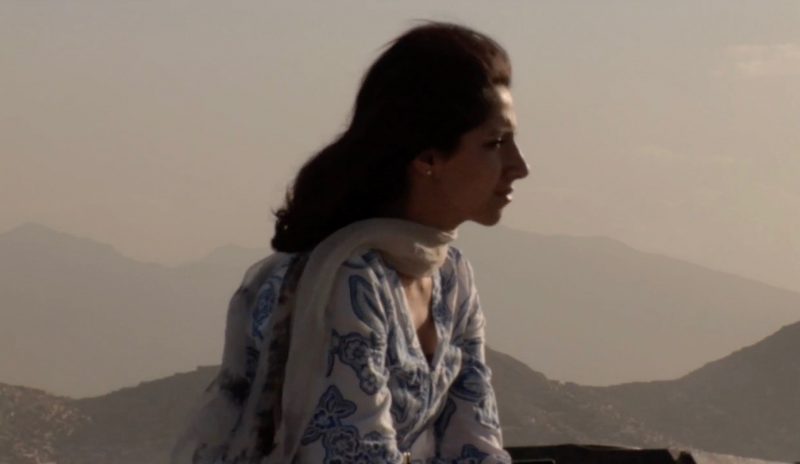
「心之所向」 截圖(由 Khazar Fatemi 上傳至 Vimeo 的版本)
乍看之下,瑞典主要電視臺的記者 Khazar Fatemi 是個既聰穎又美麗、無憂無慮的人。但他在阿富汗所拍攝的紀錄片「心之所向 [1]」,充分展現了他承自於父母的那股犧牲小我與奮鬥不懈的精神。
Fatemi 出生於 1983 年;八歲的時候,他(當初曾參與過伊朗庫德族(Kurdish)反抗運動)的雙親[為了]逃離日益頻繁的暴力衝突,舉家自他們的第二故鄉阿富汗搬到瑞典。
當時,聖戰士(mujaheddin)已經擊退蘇聯的入侵,卻陷入了內鬥的漩渦之中。年紀稍長,Fatemi 對兒時住過的阿富汗首都喀布爾(Kabul)泛起了深深的思念之情,也湧起一股內疚感,因為──和他的朋友們不同──他成功逃離了阿富汗的血腥內戰。
「心之所向」在淚水與笑聲中,講述了 Fatemi 的返鄉之旅──只不過,喀布爾已然人事全非。在阿姆斯特丹國際紀錄片影展(IDFA [2])與雨舞影展(Raindance Film Festival [3])等國際影展放映過後,本片以其真誠,贏得不少掌聲。
他的旅程,是一位記者的旅程──為了親眼目睹阿富汗今日光景,也是一個人的旅程──為了尋訪童年故舊。然而,他心心念念的摯友,卻杳然無蹤。他一直沒查出,這位朋友後來怎麼了。
全球之聲最近與 Fatemi 碰面,和他進行了一番談話──從生於穆斯林多數之國家的人在歐洲生活所遭遇的困難、他的童年,到阿富汗動盪的過往與現狀,無一不談。
Nevena Borisova(NB):身為一位深受極度傳統社會影響的現代女性,是什麼感覺?
Khazar Fatemi (KF): The reason my family fled Iran during the 1980s was that they wanted to keep the freedom their parents have given to them, despite their own religious background […] My grandparents were Muslims but still believed that everyone has the right to make their own choice of life and beliefs. So, for me it is important to use the freedom my parents fought so hard for, including [their struggle] against the regime, which left them with no choice but to leave their home. For 35 years they have not been able to go back.
The biggest challenge for me is not that I am coming from a traditional society. For me it has been Swedish society, which keeps questioning me because of my foreign name the way I look. I have had to work ten times harder to prove myself, despite the fact that I know Swedish perfectly. God knows what my mom has gone through because of her accent.
Khazar Fatemi(KF):我的家人之所以在 1980 年代逃離伊朗,就是為了想保住他們的父母親在自己的宗教背景之下,仍賦予他們的自由[⋯⋯]我的祖父母是穆斯林,但仍相信每個人都有權利去選擇自己的生活與信仰。所以,對我來說,善用我父母千辛萬苦──包括對抗政府──所掙來的自由,是很重要的。[對抗政府]讓他們別無選擇,只能離鄉背井。三十五年了,他們都還沒能回去。
對我而言,最大的挑戰不是出身於傳統的社會;我最大的挑戰是:瑞典社會因為我的名字、樣貌和一般瑞典人不同,而不斷地質疑我。我一直都得比別人努力十倍來證明自己,儘管我的瑞典文一點問題也沒有──天知道我媽媽因為他的口音,都經歷了些什麼。

「心之所向」 截圖(由 Khazar Fatemi 上傳至 Vimeo 的版本)
NB:你在紀錄片中解釋過,當你的團隊在喀布爾四處遊歷的時候,那裡有常態性的安全措施、炸彈檢查之類的。你如何處理那種恐懼感?
The fear is always there, but one still can travel under control. I have tried my best to work with people that have the knowledge of security but they also know the local society, culture, tradition and religion. We tried not to leave the car unwatched and we also tried as often as we could to travel low key profile. We did not stay too long and we even changed our car from day to day when it was possible. At the same time, no one has ever taken so much care of me [as my team]. Even when I got sick, they treated me so well. I'm their guest, they kept saying.
KF:那種恐懼是一直都在,但你還是能正常旅行。我盡量和了解安全措施,也了解當地社會、文化、傳統與宗教的人合作。我們試著不要讓車子離開我們的視線;旅途中,我們也試著盡可能保持低調。我們不待太久,可能的話,我們甚至每天換車。但是,從來沒有人[像我的團隊]那樣照顧我;即使在我生病的時候,他們也對我很好。他們一直說,我是他們的賓客。
NB:這部紀錄片拍攝的方式,讓人感覺它很真誠,捕捉到所有情緒。能不能告訴我們,你是怎麼想到要拍攝這部紀錄片,又是怎麼著手進行的?
KF: When you make a documentary, you know what you want. However, we never had a script, so we just let the camera roll and hoped for the best. I kept asking myself what had happened to those who didn't have the chance to flee when the war came. I wondered what had happened to my best friend Marim, to my teachers, to the baker in the neighborhood. So, I had all these questions that I needed to find answers to. Maybe I wanted to ease my own guilt which kept growing the older I got. I had always known I would go back at any chance, so why not document it? So I talked to my media outlet and asked if I could borrow technical equipment.
I have learned that if you just listen to what people say, you will understand that they have amazing, heartbreaking, but inspiring and empowering stories to tell.
KF:拍紀錄片的時候,你知道自己要的是什麼。但我們從來就沒有腳本,所以我們只是讓攝影機一直拍,然後希望能呈現出最好的結果。我一直問自己,戰爭爆發的時候,那些沒機會逃離的人怎麼了。我想知道,我最好的朋友 Marim、我的老師們,還有附近的麵包師傅怎麼了。所以,我有一大堆問題,卻沒有答案。也許我是想要撫平自己與日俱增的罪惡感。我一直都知道,只要一有機會我就會回去,那麼為什麼不把它記錄下來呢?所以我去和電視臺談,問他們我是不是可以借用器材。
我學到,只要你好好聽別人講話,就會知道,他們有許多很棒的、令人心碎卻又鼓舞人心、能讓人從中得到力量的故事可說。
NB:從紀錄片中我們可以清楚看到,近年來阿富汗的安全和貧窮問題是越加惡化了。但你認為阿富汗人變了嗎?還是和以前一樣有韌性嗎?
KF: The worst was the hopelessness, especially among men. Many times it felt that women were braver. Many of them continue studying, even if they know that the society won’t let them in, when it comes to time to actually work.
The young men I talked with wanted to leave the country, they didn't see any future for themselves. The elders keep living with the corrupt system and the so called “leaders” and [believe] foreigners only come to Afghanistan to serve their own interests. This lack of trust and disappointment has grown every time I returned. When I was there in 2008, Kabul was safe and we even traveled with a car on roads, whereas today it is totally impossible to travel. Now, even Kabul has become very unsafe. For me as a journalist it means it is more difficult to gain the trust of those I interview, to get close and to understand them. The good thing is that I see how the young generation which got the chance to get an education has really done well. One can find hope there, especially among young women, even though they are fighting two wars — one a physical war, with poverty and the insecurity, the other in terms of their own society, family, tradition, culture…
KF:最糟的就是失去希望,[這點]在男人中尤為明顯。很多時候,感覺上女人要勇敢得多。很多女人都繼續求學,即便他們知道,在實際要就業的時候,社會不會給他們機會。
我訪問到的青年男子都想要離開阿富汗,他們看不到自己的未來。老一輩的人,則是繼續容忍腐敗的體制以及所謂的「領袖們」,[相信]外國人來到阿富汗都只是為了自己的利益。每次回去,這種不信任與失望的感覺都越來越強。2008 年我在那裡的時候,喀布爾很安全,我們甚至能開車去旅行,但現在要旅行是完全不可能了。現在即便是喀布爾,都已經變得很不安全。作為記者,這表示要得到被訪者的信任、去貼近他們、了解他們,變得更困難了。但我也看到好的一面:有機會受教育的年輕一代,都做得很不錯。那裡還是有希望的,特別是年輕女性,雖然說他們要面對的是雙重的戰爭── 一個是關於貧窮與安全問題、實實在在的戰爭,另一個則是關於社會、家庭、傳統、文化⋯⋯等方面的戰爭。

「心之所向」 截圖(由 Khazar Fatemi 上傳至 Vimeo 的版本)
NB:身為女性,在拍攝這部紀錄片的過程中,你是否曾感受到敵意?
KF: I haven’t noticed this so much, because they still treated me as a foreigner. But I can say that taking a walk around the neighborhood, going to the bazaar by myself, even if I almost managed to fit into the crowd, it would still have been much easier if I was a man. I have also noticed that women didn’t feel comfortable to be interviewed in front of the camera. […] Attitudes about women have only grown harder. I think I got away with that, because I am regarded as a foreigner.
KF:我沒怎麼感受到敵意,因為他們還是當我是外國人。不過我可以說,即便我幾乎成功地融入到群眾之中,能夠自己在鄰里間走動、上市場,但如果我是男人,那還是會容易許多。我也注意到,女性在攝影機前受訪會感到不自在。[⋯⋯]對待女性的態度,是越來越惡劣了。我想他們之所以沒那樣對待我,是因為他們覺得我是外國人。
NB:你也想念伊朗嗎?你對那裡的社會現狀印象如何?
KF: No, I don’t have any nostalgia feeling, but would love to go back one day.
KF:不,我不想念伊朗,但很希望有天能回去。
NB:蘭德公司(RAND corporation)[譯註:美國智庫]研究員 Cheryl Benard 說,來自阿富汗的年輕人──不是老一輩的阿富汗人或來自其他國家的年輕人──移居歐洲後,特別難以融入[當地]社會。這樣說公平嗎?
KF: I don’t know about such a phenomenon, What I know from studies made here in Sweden is that Afghans are doing very well. They learn Swedish much faster than other groups. Of course when maybe 80% of the youth that come here [from other countries] are from Afghanistan, [it is no surprise] that when crimes are committed by migrants, most of them turn out to be from Afghanistan. But as I mentioned, we are talking about people who value education and have managed to learn the language and integrate into society faster than other groups, as one study I know has shown.
KF:我不知道有這樣的現象。就我從瑞典這裡的研究所了解到的,阿富汗人過得相當不錯。比起其他族群,他們學瑞典文要快得多。當然,在可能有八成[外來的]年輕人都來自阿富汗的情況下,如果有移民犯罪,多數的犯罪者都是阿富汗人[就沒什麼好驚訝的了]。但就像我前面說過的,我們在談論的是重視教育、不但學會了瑞典話還比別人要更快融入社會的族群──我知道有個研究的結論是這樣。